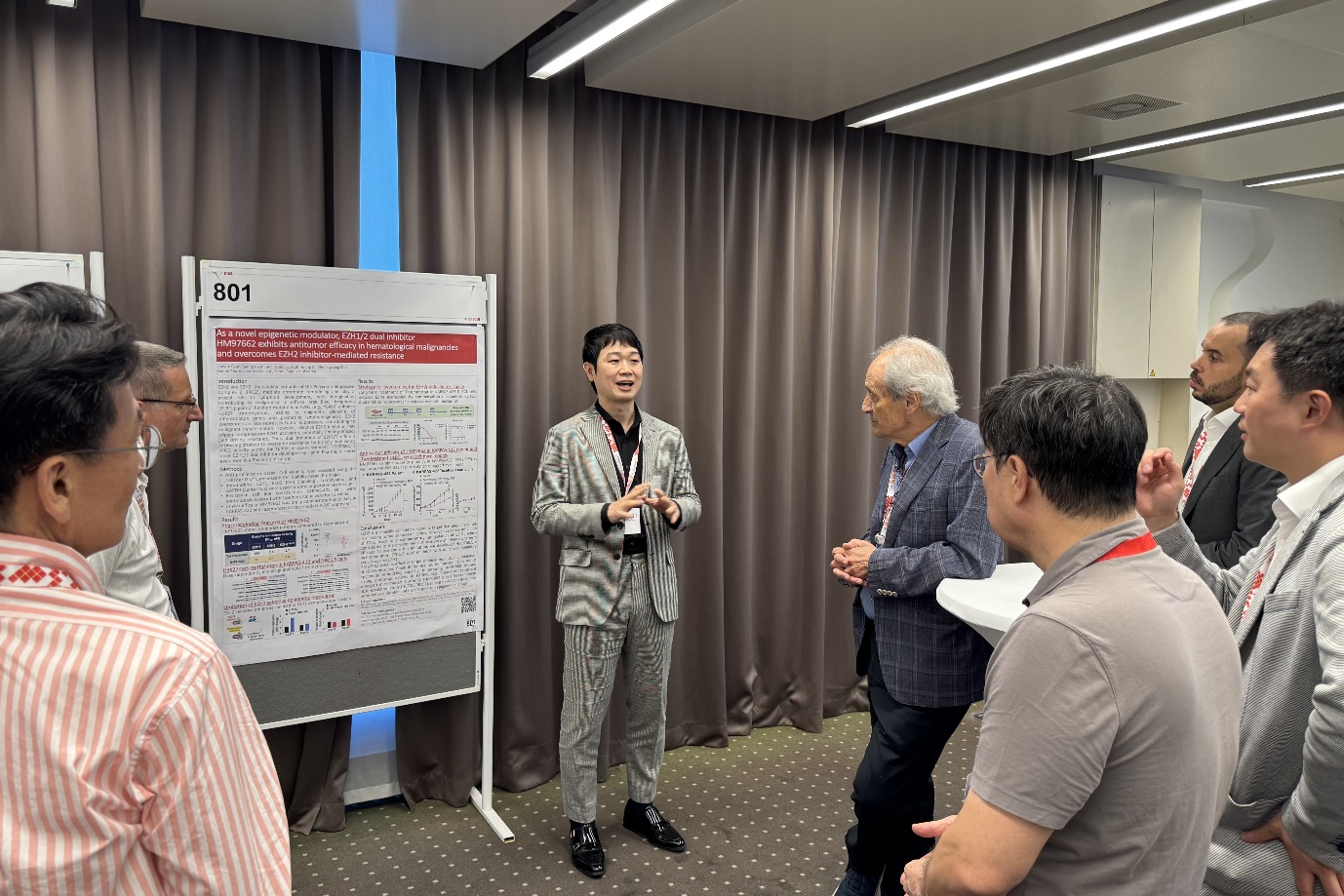Hanmi’s Next-Generation EZH1/2 Dual Inhibitor Demonstrates Potential to Overcome Resistance Mechanisms
Hanmi’s Next-Generation EZH1/2 Dual Inhibitor Demonstrates Potential to Overcome Resistance Mechanisms
Hanmi Presents Preclinical Data on HM97662 in Hematologic Malignancies at ICML 2025
HM97662 Exhibits Superior Antitumor Activity Compared to EZH2-Selective Inhibitor Tazemetostat

Dr. Young Su Noh (center), Director of Hanmi’s Oncology Clinical Team, presents the latest research findings on HM97662 to attendees, including Dr. Franco Cavalli (fourth from left), and president of the ICML, at the International Conference on Malignant Lymphoma (ICML 2025) held in Lugano, Switzerland.
(July 4, 2025) Hanmi Pharmaceutical’s next-generation targeted anticancer therapy, the EZH1/2 dual inhibitor HM97662, has drawn significant attention from global lymphoma experts following preclinical findings indicating its potential to overcome EZH2 inhibitor-mediated resistance.
Hanmi participated in the 18th International Conference on Malignant Lymphoma (ICML 2025) held from June 17 to 21 in Lugano, Switzerland, where it presented preclinical data on HM97662 in a scientific poster session.
HM97662 is being developed as an innovative targeted therapy that inhibits both EZH1 and EZH2, offering enhanced antitumor efficacy and the potential to overcome EZH2 inhibitor-mediated resistance.
EZH1 and EZH2 proteins, often referred to as "key epigenetic regulators" play critical roles in the development, progression and differentiation of malignant tumors. By simultaneously blocking both proteins, HM97662 is believed to effectively suppress the activity of the Polycomb Repressive Complex 2 (PRC2), a key oncogenic complex, thereby delivering potent antitumor effects.
At ICML 2025, Hanmi presented data showing that HM97662 more potently and dose-dependently inhibited H3K27 trimethylation in DLBCL (KARPAS-422) and multiple myeloma (MM1.S) cell lines, compared to the EZH2-selective inhibitor Tazemetostat (Tazverik).
HM97662 monotherapy demonstrated significant tumor growth inhibition DLBCL models. Moreover, in tazemetostat-resistant DLBCL cell lines generated through prolonged exposure to the EZH2-selective inhibitor tazemetostat, a compensatory upregulation of EZH1 protein expression was observed.
In KARPAS-422 Tazemetostat-resistant xenograft mice models, HM97662 retained strong antitumor activity, suggesting that dual inhibition of EZH1 and EZH2 may represent a novel therapeutic strategy capable of overcoming resistance mechanisms associated with EZH2-selective inhibitors.
HM97662 is currently being evaluated in a global Phase 1 clinical trial in South Korea and Australia to assess its safety and tolerability in patients with advanced or metastatic solid tumors.
Hanmi plans to present the first-in-human Phase 1 clinical data of HM97662 at the European Society for Medical Oncology (ESMO 2025) Annual Congress this October.
“This study presented at ICML 2025 highlights HM97662’s unique efficacy profile and its potential to overcome resistance in preclinical hematologic cancer models,” stated a Hanmi official. “We believe this dual-target approach could redefine therapeutic strategies and broaden treatment options across multiple cancer types.”
HM97662 was selected in 2021 as part of South Korea’s national drug development program supporting anticancer therapies for areas of high unmet medical need.